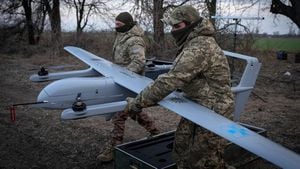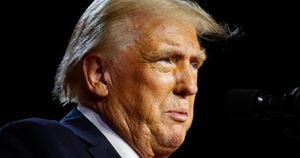Indonesian President Joko Widodo recently made waves with his substantial diplomatic visits to China and the United States, showcasing Indonesia's growing international influence. These high-profile trips signal not just the strengthening of bilateral ties but also reflect Indonesia's strategic position amid regional and global shifts.
During his visit to China, Widodo met with President Xi Jinping, marking another step forward in the partnership between the two nations. Widodo highlighted the significance of the China-Indonesia relationship, which he described as being founded on mutual respect and benefit. The visit was characterized by discussions on economic cooperation, infrastructure development, and trade relations, with both leaders affirming their commitment to enhancing ties.
Xi Jinping praised Indonesia's role as the largest economy in Southeast Asia and emphasized collaborative efforts to tackle common challenges, such as economic recovery post-pandemic and climate change. The two countries announced several key outcomes, including agreements aimed at intensifying trade, with China’s investments expected to be channeled toward Indonesian infrastructure projects, boosting local job creation.
Following his triumphs within the region, Widodo's agenda turned westward as he embarked on his trip to the United States, where he engaged with President Joe Biden. This visit is particularly significant, as it was underscored by discussions surrounding the recent tensions experienced between the U.S. and China, with Indonesia positioned as a possible mediator due to its close ties with both nations.
While speaking with Biden, Widodo underscored the importance of maintaining peace and stability within the Indo-Pacific region. The discussions also spanned economic cooperation, climate change initiatives, and the reinforcement of democracy. Both leaders acknowledged the pressing need to address global issues, such as the pandemic, food security, and sustainable development.
Widodo's U.S. trip involved meetings beyond just presidential talks. He also engaged with various industry leaders and representatives of American companies. This outreach was aimed at encouraging investments back to Indonesia, positioning the nation as an attractive destination for business amid fears of declining manufacturing bases elsewhere due to past geopolitical tensions.
Experts point out these visits are integral to Indonesia's broader strategy of balancing relationships within the competing interests of superpowers. For Indonesia, being able to navigate these waters effectively will bolster its role not just regionally but globally, fostering economic growth and maintaining sovereignty over its foreign policy.
Both trips—one to China and the other to the U.S.—highlight Indonesia’s diplomatic adeptness and flexibility. Having secured key agreements with two major world economies, Widodo's government appears poised to leverage its strategic geographic position to solidify its economic resilience amid global uncertainties.
Market analysts and political observers view these diplomatic moves as timely and shrewd, recognizing the pivotal role Indonesia can play within the ASEAN framework. With China's rising influence and the U.S.'s outreach to Southeast Asia, Indonesia is positioned as not just another nation but becomes central to regional discussions and decision-making.
Widodo's administration has been praised for taking proactive steps to modernize Indonesia's economy, focusing on digital transformation and sustainability. During his conversations with leaders, this vision was articulated clearly, emphasizing the need for sustainable investments to generate long-term benefits for the Indonesian populace.
The navigational diplomacy exhibited by Widodo provides insightful lessons on contemporary statecraft, especially for smaller nations trying to maintain autonomy amid competing powers. Indonesia’s increasing significance cannot be underestimated; as it carves out its niche on the world stage, it reflects the shifting dynamics of power relationships globally.
When comparing the strengths of both visits, it’s apparent how each nation plays to its strengths. China, with its vast investment capabilities, looks to expand its influence through economic partnerships; on the other hand, the U.S. seeks to reinforce alliances with Indonesia by promoting shared values and security interests.
Reflecting on the outcomes of these diplomatic endeavors, there’s much to discuss about future developments. The strengthening of China-Indonesia ties could lead to enhanced economic partnerships, just as the U.S. trip may inspire more direct American investments.
Widodo's visits are garnished with hopes for enhanced trade and not just passive diplomatic engagement. With the backdrop of the sea of geopolitical tensions, he illuminates pathways for cooperation, fostering possibilities for business ventures, technological exchanges, and cultural bridges. This nuance of diplomacy may be what sets Indonesia apart and leads to sustained economic benefits, allowing it to emerge stronger from global shifts.
Overall, the Indonesian President's twin visits served as more than mere diplomatic gestures. They represent strategic undertakings aimed at positioning Indonesia advantageously within the broader international arena. By nurturing relationships with both China and the U.S., Indonesia is not just feeding its economy but also proudly establishing itself as a key player on the world stage.
While each of these nations, China and the U.S., may advocate differing ideologies and intentions, it's clear the partnerships are built on the foundations of pragmatism and necessity. Indonesia, as it stands, remains the focal point of attention, inviting optimism for its role moving forward.
Looking forward, the real challenge for Indonesia is to harmonize these relationships, ensuring its own economic objectives aren't lost amid global pressures. The world watches as Jokowi deftly maneuvers through the intricacies of diplomacy, aiming to deliver for his nation without losing sight of the bigger picture.



